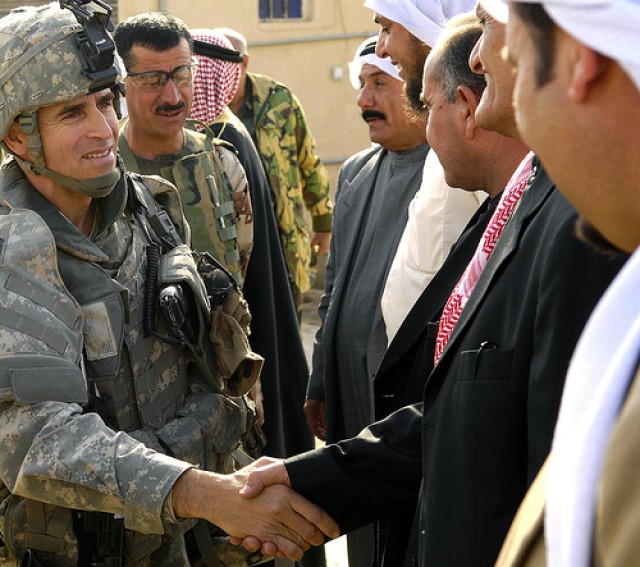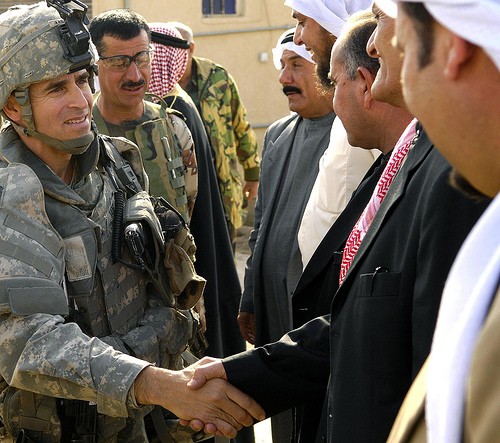
ARLINGTON, Va. (Army News Service, March 8, 2011) -- The U.S. Army is continuing to expand its ranks of contingency contracting officers and noncommissioned officers tasked with providing forward contracting support to ongoing war zone and humanitarian missions worldwide.
"As a contingency contracting officer, you support the warfighter by conducting the daily business necessary to make operations happen. It could be buying commodities, construction and service contracts. Basically this involves making sure operations continue to flow," said Lt. Col. Dennis McGowan, 905th Contingency Contracting Battalion Command.
Last year, the Army conducted 108 contingency contracting missions in 39 countries, including combat support missions in Iraq and Afghanistan, as well as humanitarian relief efforts in Haiti and Pakistan.
CONTRACTING IS FOR EVERYONE
Contingency contracting, called 51C or 51 "Charlie," was stood up as a military occupational specialty, or MOS, in December 2006. The Army is looking to add 95 to 100 new members each year, said Master Sgt. Jason Pitts, chief 51C Noncommisioned Officer proponent, Acquisition Support Center.
For years the field was dominated primarily by logistics or financial specialists, but no more.
"We're looking for smart, intelligent leaders throughout the Army to come into the 51C MOS - whether or not they are officers or enlisted," Pitts said. "We are looking for excellence as demonstrated in their current duties and the potential for future excellence."
"When we first started growing this, the only people that knew about his were logisticians. They bring a lot of stuff to the fight, but we also want to let the rest of the Army know about our MOS. We are looking for a well-balanced contracting team - that is what I see as a benefit of attracting new people," said Pitts.
Interested candidates are encouraged to go to the 51C website which contains all the instructions regarding how to put a packet together, Pitts said.
"We're looking for sergeant promotables, staff sergeants and sergeants first class with less than 10 years of service. We do waivers for those with up to 13 years service. We're targeting younger guys with some college who have served in key leadership positions. You have to have a GT [General Technical] score of 110," said Pitts.
Contingency contracting teams are set up in a regional contracting team on an installation with four-man teams consisting of two officers and two enlisted personnel placed inside of a civilian contracting office, Pitts and McGowan said.
The perfect contracting team would have experience across the full spectrum of Army specialties to include logistics, combat arms, finance and other areas, Pitts said. That way, each member could leverage their unique experience, couple that with contracting knowledge, and provide the warfighter with what they need when they need it.
REWARDING WORK
In recent years, contingency contracting officers have labored intensely in various global "hot" spots as part of counter-insurgency and humanitarian relief efforts designed to help local populations stand up businesses, rebuild their economies and establish employment for large numbers of people.
As an integral part of the war efforts, contingency contracting operations have made a significant contribution to overall counterinsurgency progress in Iraq and Afghanistan, McGowan and Pitts explained.
For instance, while in Iraq, McGowan helped local Iraqi businesses work through a mentor-protege contracting program to learn how to develop the capacity to produce concrete by working with other nations such as Turkey.
"This helped build the economy and helped build the capacity of the host nation to develop concrete on its own," said McGowan.
"In my 12 months as a contracting officer, I saw businesses in my first few months that were very immature. They were just starting to figure out how to do work. By the time that I left, you would see some of these businesses that were more mature and had more employees. It was exciting to be a part of watching these business grow. I found that rewarding," he said.
McGowan added that an Iraqi woman told him that in the year his unit was there, the nation of Iraq had advanced 500 years.
In Afghanistan, Pitts helped establish a women-owned business to make uniforms, blankets and clothing for the Afghan National Army and Afghan Police.
"You had women stand up factories and produce items for the Afghan National Army and police. We were building quality factories which would not have happened if we were not there partnering with American companies to make this happen. You could see the excitement, because the women and their families knew that they were going to have jobs. When you see that and realize you are playing a part in that. That is pretty rewarding," Pitts said.
"Every time you employ an Afghan, that is one person with a job who will hopefully be one less person likely to plant (improvised explosive devices). So that helps the war effort," he added.
Contingency contracting training opportunities are available at the Mission Ready Airman's Course, San Antonio, Texas, and at the University of Huntsville, Ala., Acquisition Base Course.

Social Sharing